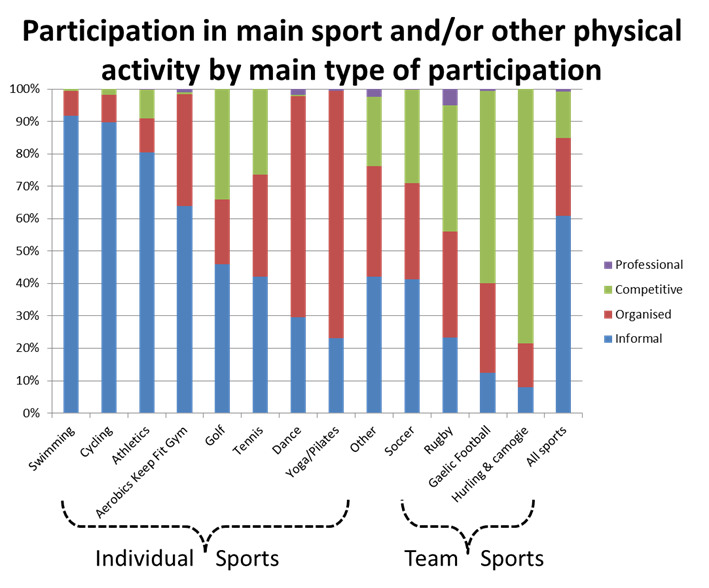Last week I wrote about sports participation in Ireland using data from the Central Statistics Office (CSO). The piece (available here) proved quite popular. In light of this, here's some further analysis on just how we play sport in Ireland. Like my previous post, information on the thirteen categories identified by the CSO is used to illustrate the different dimensions to participation in Irish sport. An "Overall" category is also included.
According to the CSO, sports/physical exercise participation can take four forms: 1. Informal/Casual, 2. Organised Activity (non-competitive), 3. Organised Competition and 4. Professional/Semi-professional. The data for the fourteen categories is presented below.
Our native games, Gaelic Football and Hurling & Camogie, are more predominately played in a 'competitive' fashion. More than 80% of all hurling and almost 60% of all Gaelic Football are played in an organised competition. The GAA should probably attempt to find out why informal/casual and non-competitive forms of their games are not as popular as other sports.
Soccer, tennis and golf are among the most balanced sports in terms of participation, when one excludes category 4. Soccer is mostly played in an informal or casual manner (41.2%), followed by non-competitive (29.7%) and then competitive soccer (28.9%). Just 0.2% of the sample of 254 reported that they received payment for playing soccer (lucky them!).
Rugby is the most balanced when one includes the Professional/Semi-professional. The reported figure of 5.1% in the Professional/Semi-professional is the highest of any of the thirteen categories. The sport also seems to have an excellent blend of competitive and non-competitive players. A 56% to 44% split between non-competitive (Categories 1 and 2) and competitive (Categories 3 and 4), makes it the most balanced sport in the sample. The CSO do warn however that the sample of rugby players, at just 56, does subject their results "to a wide margin of error".
Yoga/Pilates and Dance are dominated by female participants. Organised competition is non-existent in Yoga/Pilates and virtually non-existent in Dance. In fact, one is more likely to be a professional. Both exercises are pursued mainly in an organised but non-competitive manner. The informal/casual Dance figures are very interesting. What does this include? Disco dance-floor moves?

 RSS Feed
RSS Feed